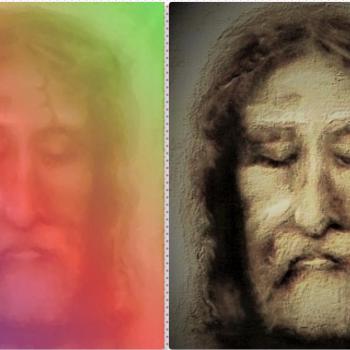
Scripture often talks about God anthropomorphically as if God were human. Sometimes, this is done by talking about God’s actions as if God achieved them in the way humans do, such as through by use of hands or feet. Sometimes, it is done by expressing God’s actions as if they followed some sort of human passion like anger (or wrath). God’s anger is said to be provoked by the accumulation of sin. “It is as though the guilt had grown to the point that even God, who is by nature unmoved by either anger or hate or any other passion, appears to be provoked by anger.” [1]
Sadly, many take such texts in a very simple fashion; they assume they were meant to be taken literally, and in doing so, are led to all kinds of misunderstanding of the nature of God. God becomes, as it were, another contingent being among others, one who has a body like us. This stands in stark contradiction to other verses which suggest the exact opposite, that is, that God is Spirit and not a material being (cf. Jn. 4:24).
Someone might ask, when we come across apparent contradictions in Scripture, how do we know how to deal with them? Why do we choose one hermeneutic over another, one which uses some verses to radically interpret others? Why do we take some texts allegorically, but not others? There are many ways these questions can be answered, each which have value, but each which will also take considerable time and effort to explore them properly, something which cannot be done with a short reflection. Nonetheless, it can be suggested that some texts in Scripture indicate we should use this method, that is, they suggest we do not always take things in Scripture at face value, that often times there are texts which are meant to be examined allegorically (cf. Gal. 4:21-31; Heb. 9:9; 1 Cor. 9:9; et. al). Knowing this, then many, like Origen point out, if a particular text seems to imply something bad about God, we should question that text and see if there is an allegorical take which can help us understand the text in a way which does not leave God appear to be malevolent. This suggestion is not only a normative take for the Christian tradition, it is one which is also found throughout the Jewish tradition as well. Neither tradition wants us to understand anthropomorphic representations of God are literal. God is not like us (cf. Num. 23:19).
God is not composed of parts, God does not possess human passions, and God does not change. When it seems as if God is changing, what changes is not God, but our apprehensions of God and the way they help us understand God’s eternal, unchanging activity. We can and will express those experiences through human conventions, conventions will speak of God as if God were changing. We must not take such expressions literal. If we did, we would have a very poor concept of God. But they still express experiences, experiences which can named by such conventions, so long as we realize that behind such conventions lies a greater truth. Thus, what we conceive as God’s anger is not really anger but something else, something which can be said to relate to God’s love. For God is love, and all that God does in God’s eternal activity is done out of that love.
St. Jerome, understanding this, explains how we are to understand various anthropomorphic conventions we use for God:
Now with respect to God, we ought to interpret fury, forgetfulness, wrath and repentance in the same way we understand his hands, feet, eyes, ears, and other members. The incorporeal and invisible God is said to have these, not that he stands exposed to these perturbations, he who extinguishes them in us by the gift of his own grace, but in order that we may understand God’s affections for us by means of our words. For wrath, which is the desire for revenge, is defined in God in such a way as among men. It has its material in our vices, not in the will of the Lord. We are the ones who treasure up wrath for ourselves on the day of wrath and revelation of the just judgment of God [cf. Rom 2:5], as our thistles, thorns, and darnels [cf. Gen 3:18] that we have produced instead of the seed of God [cf. Matt 13:23-24]. Let the wise flame consume the wood as well, the grass and stubble, which we have built upon the foundation of Paul [cf. 1 Cor 3:12]. [2]
God’s nature is spiritual. “God is spirit, and those who worship him must worship in spirit and truth” (Jn. 4:24 RSV). God’s nature transcends us, but we discuss God in relation to the way we experience God interacting with us, allowing us to impute various actions to God. When it seems God is acting out of some passion, such as wrath, we must understand it really reflects something which we bring to our interaction with God and is reflected back to ourselves.
God can be described as a consuming fire of love (cf. Deut. 4:23-4), a fire which consumes all that is not like God, that is, all that is unlove, so as to leave behind what is bound by and connected with love. Sin is unlove, and so our sin, when confronted by the fire of God, is consumed, becoming, as it were, material which is put to the flame, fueling God’s “anger” as St. Jerome indicate. That is, when we encounter God and God’s love, we will experience the purifying nature of God’s love, a purification process which we will experience as God’s judgment of sin. Our sins, not God, are the source and foundation for our judgment, indeed, sin can be said to be its own punishment. While we are attached to our sins, they will cause us pain and sorrow as they corrupt us, having us personally dwindle away as it eats at and consumes our being. The worse the corruption, the more God will have to purify in our encounter with divine love. Thankfully, as we are purified from our sin, God gives us healing grace, grace which helps restore what sin had destroyed. For we need to find ourselves restored to what we were before our sin before we can continue on, engage God’s love further, and receive deifying grace, a grace which will lift us up beyond our initial potential into something far, far, greater.
God can be said to be angry with sin because God, upon discovering it in us, works to put it to an end, for our own good. It is love, not anger, or worse, hate, which leads to God’s confrontation with sin. And this is something which was made clear by Jesus:
What is new in Jesus’ message and distinguishes it from the Old Testament is that he proclaims God’s mercy for all in an ultimate way. Jesus opens up access to God not just for a few righteous people, but for all. There is room for all in God’s kingdom; no one is excluded. God has finally taken back his wrath and has given full scope to his love and mercy. [3]
After what Jesus has revealed to us about God, we should change the way we understand God’s relationship with us. It should confirm our allegorical reading of difficult texts. While, before the incarnation, we can find indications of God’s love, indeed, some which could have us conclude that God is love, with the incarnation and the completion of revelation fulfilled in it, we can find such a way of engaging those texts are verified. We now know how central love is to God and all that God does comes out of God’s love. God does not act with malice, but out of mercy, the mercy which flows from God’s love. Sin is a problem, a problem which God confronts with love, doing what God can to overcome it. It is as if God cauterizes us from the open-wound which sin creates in our being, and then provides us the grace we need to be healed. That is the point of the cross. Sin is taken from us by Christ, and is then discarded to where it belongs, in the abyss. Then, we are freed from it and can find ourselves taken into Christ and lifted up in him and by him in his resurrection from the dead. However painful our experience might be when we encounter God’s purifying love, we must not misinterpret it as if God is some sort of sadist seeking to cause us such pain. God does not want us to suffer. Sin makes us suffer, which is why God’s actions towards sin can and will appear to be anger. But, we must understand, when we describe such actions as anger, it is only an allegorical convention, for God does not possess anger like us. God bears no malice. God is pure love, and all that God does should be understood in relation to that love, a love which works for the greater good of all.
[1] St. Ambrose, “On Noah” in Treatises on Noah and David. Trans. Brian P. Dunkle, SJ (Washington, DC: CUA Press, 2020), 35.
[2] St. Jerome, Commentary on Isaiah in St Jerome: Commentary on Isaiah; Origen Homilies 1-9 on Isaiah. Trans. Thomas P. Scheck (New York: Paulist Press, 2015), 828.
[3] Walter Kasper, Mercy. Trans. William Madges (New York: Paulist Press, 2013), 67-8.
Stay in touch! Like A Little Bit of Nothing on Facebook.
If you liked what you read, please consider sharing it with your friends and family!
N.B.: While I read comments to moderate them, I rarely respond to them. If I don’t respond to your comment directly, don’t assume I am unthankful for it. I appreciate it. But I want readers to feel free to ask questions, and hopefully, dialogue with each other. I have shared what I wanted to say, though some responses will get a brief reply by me, or, if I find it interesting and something I can engage fully, as the foundation for another post. I have had many posts inspired or improved upon thanks to my readers.















